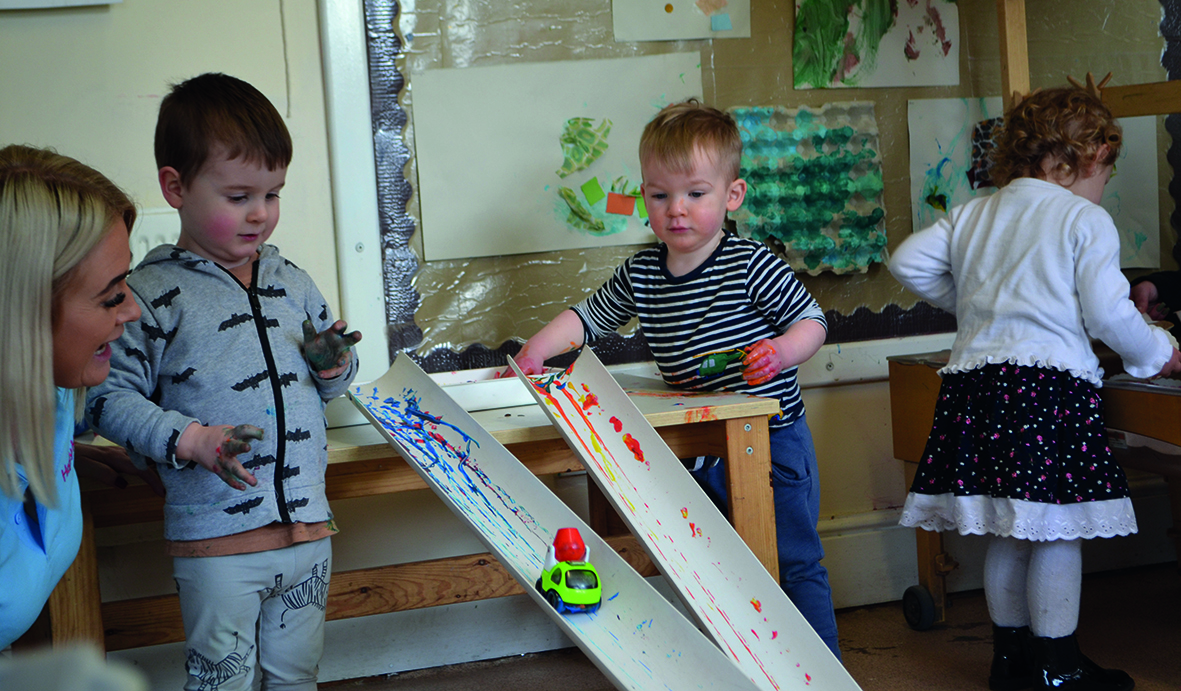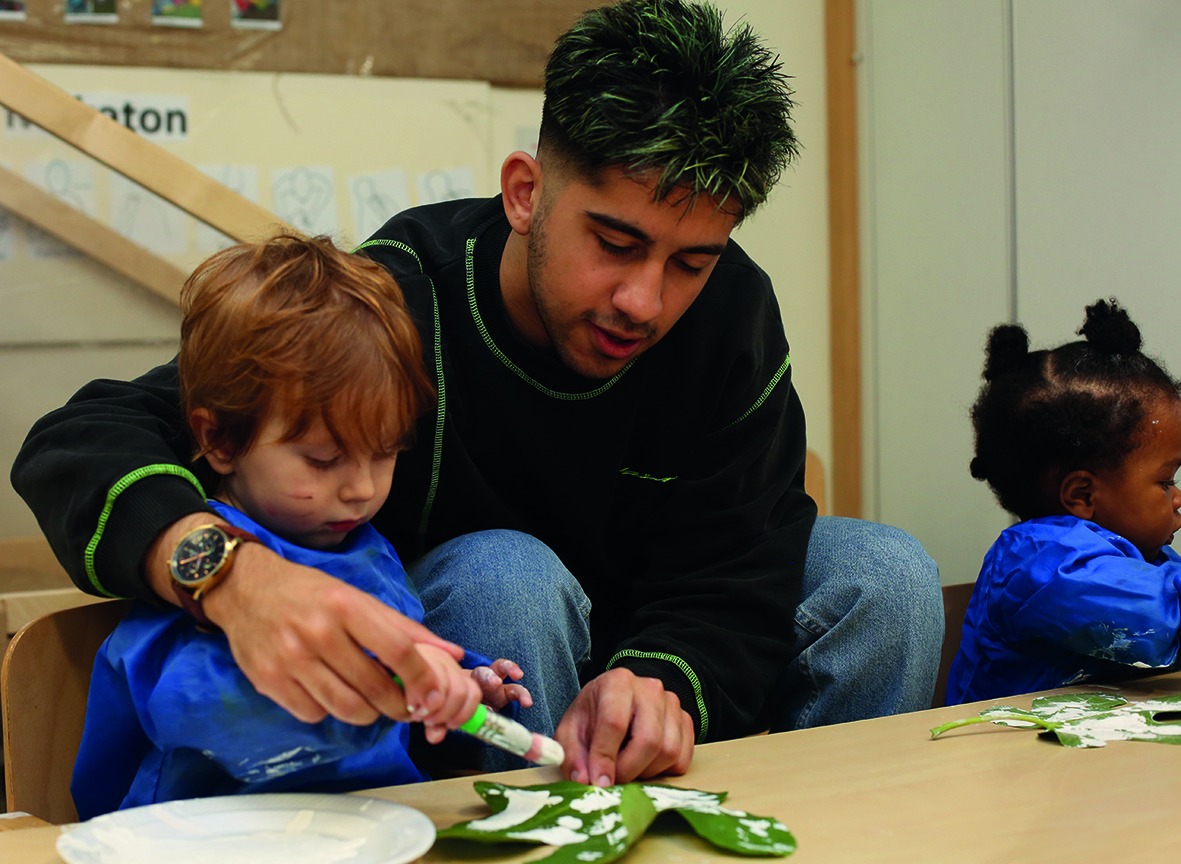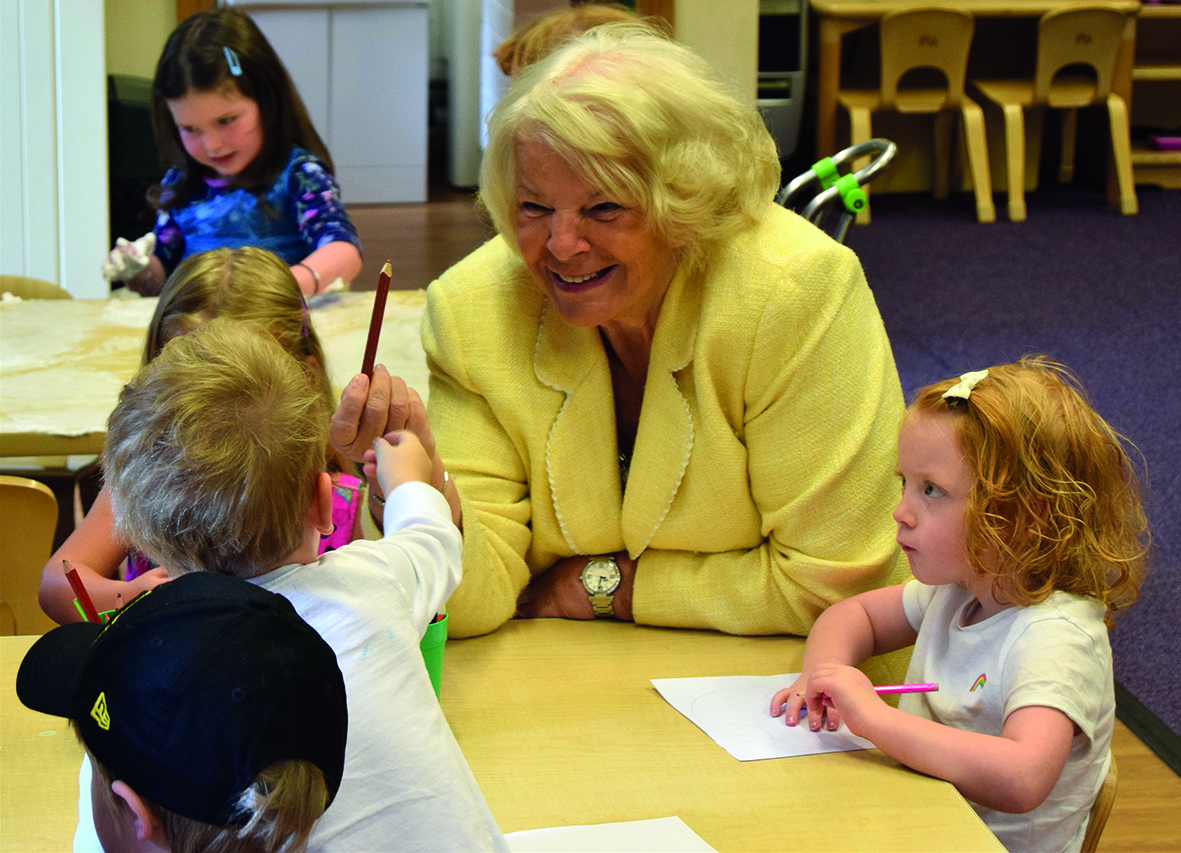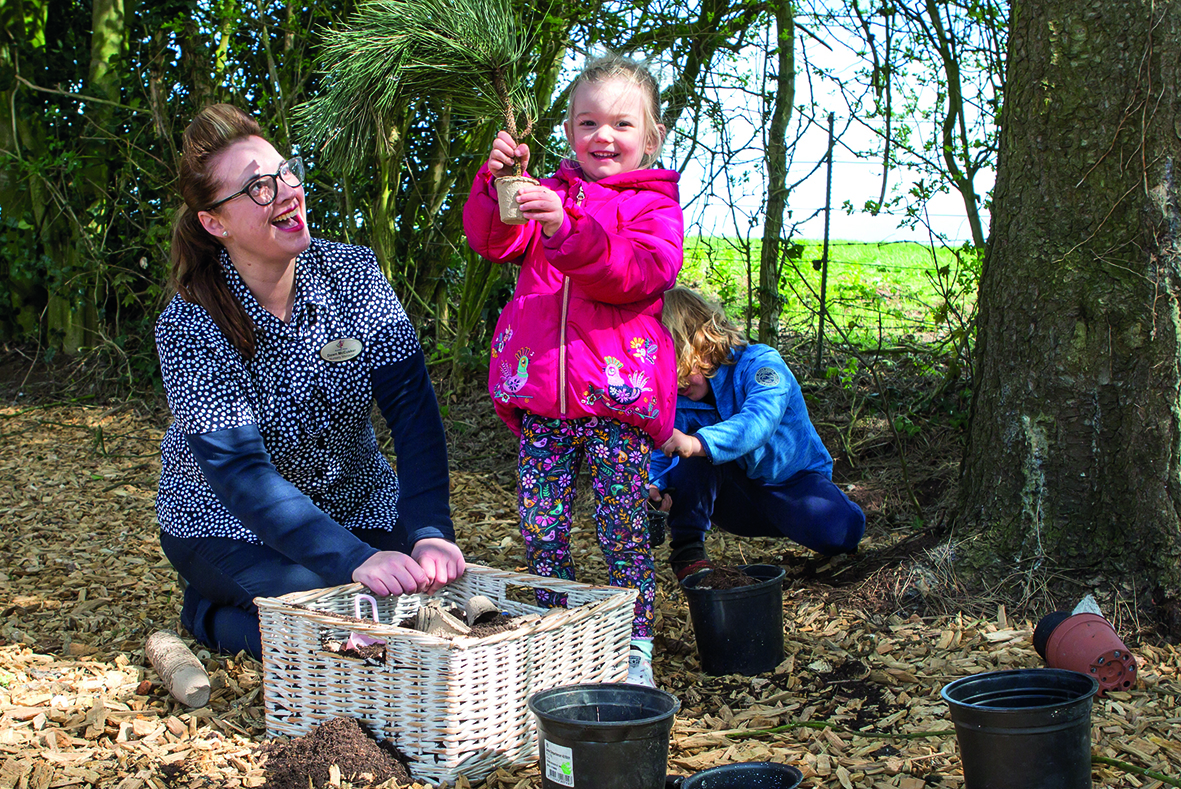
Three years ago, the childcare sector was facing up to the realities of dealing with a global pandemic. The next challenge for nursery groups should have been a focus on getting back to normal, but bigger storms are now threatening an already struggling sector.
‘As things eased [following the pandemic], we thought we could take a breather, but actually we can’t,’ says Samantha Creme, director of strategy and business development at the London Early Years Foundation (LEYF), which manages 41 settings across the capital. ‘It’s getting worse because the level of investment in the sector after the furlough grant stopped has fallen off a cliff.’
She highlights that many costs have risen sharply, from food to energy, or are due to increase from 1 April, including business rates and the National Minimum Wage rising by 10 per cent. In contrast, following years of underfunding, the Department for Education is only raising early years entitlements by 2.5 to 4 per cent depending on the local authority. ‘When nursery staff costs are 60 to 70 per cent of your cost base, the two just don’t add up,’ says Creme. ‘This is a sector-wide crisis.’
Steve Scott, director of Happy Kids, which operates six nurseries in northern England, agrees. ‘High energy costs have hit us hard. Despite the government support scheme, even at its current level, we still have the situation where the amount we were paying forgas and electric per annum, we are now paying per month.
‘Staff costs from April will also hit us hard. The deserved increase in minimum and living wages is not matched by the increases in early education funding. Some of our nurseries are almost entirely funded through early education, so we cannot offset this difference with increases in fees to parents. Not only are wages set to increase, if base rates for national insurance and pension contributions don’t rise in line with these, then more staff than currently will attract employers’ NI and pension contributions, increasing the overall staff cost further.’

PHOTO: Happy Kids says rising energy prices and staff costs are challenging
Added to financial worries is the long-running issue of recruitment. Ofsted’s annual report, published in December, found that recovery from the pandemic has been slowed by the crisis in recruitment. It warned that the early years sector is ‘losing out’ to better-paid jobs and nurseries have closed as they are unable to recruit quality staff.
‘Recruitment of Level 3-qualified staff continues to be a challenge,’ says Scott. ‘We are competing with other sectors that can pay more than we can afford to at a time when the cost of living is forcing staff – that love the job but simply cannot afford to stay within the sector – to leave.’
Kindred, which operates 31 settings in southern England, experienced a big jump in nursery occupancy in September as confidence grew following the pandemic and parents returned to offices. What should have been good for business created a recruitment dilemma, especially in city locations. While CEO Ruth Pimentel believes Kindred is ‘just about keeping ahead of the game in terms of recruitment’, she says it is more difficult for small nursery groups and single sites that are unable to redeploy staff.
RISING COSTS
The Early Years Alliance analysed Ofsted data, published in November 2022, on the number of nursery providers and found that 110 of 151 local authorities had experienced a drop in childcare places, with 5,400 providers closing in 12 months.
‘As we saw in the latest Ofsted report, there are an increasing number of closures,’ says Creme. ‘I think that will only be exacerbated when all of the price increases happen in April. It’s going to be more and more unsustainable, especially those that are reliant on funded-only places. More and more nurseries that don’t have the paying parents aren’t going to be sustainable because of the government entitlements – four years ago they were only covering two-thirds of the cost to operate and that number is definitely less now.’
Scott agrees. Happy Kids will be raising fees but, with 60 per cent of the group’s funding coming from the early years entitlement, it will have little impact on what he regards as already a ‘fairly lean operation’, making opportunity for cost savings to offset the financial challenges limited.
Honey Pot Nurseries, which owns six settings in Liverpool, is increasing fees by 8 per cent – its highest rise in 15 years of operating. ‘Unfortunately, some parents may believe that “greedy nursery owners” are lining their own pockets, but this is simply not the case,’ says director Jenna Geggie.
‘Nurseries have no choice but to increase parent fees in order to remain sustainable. It feels like each week lately, I’m hearing that another nursery has closed down. Nurseries are closing because it is not financially viable to continue. This leaves children and parents without childcare and it is at the detriment of the child who needs to settle in at a different setting.’
Pimentel says that Kindred will try to ‘weather the storm’ and wait for parents’ salaries to rise and rising costs to settle while looking at ways to be more efficient – such as changing from a four- to three-week rotating menu to reduce food waste and trialling different booking patterns for better staff deployment.

PHOTO: Kindred says raising fees is a balancing act
‘A lot of nurseries are tied into only increasing fees in April. This can result in them getting out of sync during the year and then making a massive increase,’ she says. ‘We prefer to make smaller increases of 2 or 3 per cent during the year and carefully communicate this to parents.’
Pimentel adds, ‘It’s about constantly balancing. If we were to increase fees by 10 or 15 per cent and lose a lot of parents then it’s going to take a lot of time to get those parents back.’
But she acknowledges that the bigger nursery groups are in a stronger position to hold out. ‘I’ve got the wonderful benefit of having a team that can focus on the people, a team that can focus on the marketing, branding and the sales. Also a team that can focus on the financing and making sure that we’re getting our fees right and getting the payments in and not allowing parents to get into debt,’ she says. ‘Smaller operators have got to be constantly swapping all those hats. It’s exhausting.’
Creme agrees that big groups have central costs that don’t need to be duplicated, but warns, ‘On the flip side, it also requires very careful management of your reserves and your cash. We all saw what happened to Welcome last year [a group of more than 40 nurseries which went into administration with estimated debts of £3.5 million]. Financial planning and operational rigour is needed.’
SOCIAL ENTERPRISES
Paint Pots Nurseries, which operates 12 settings in Hampshire, works across areas of disadvantage and more affluent areas. Executive director Nick Ralph hopes this model will help support the group through the tough financial climate. ‘We use the profits from the better-off areas to subsidise the losses in other areas,’ he explains.
‘We are not taking profits which then get distributed to shareholders. Our money stays in the organisation because it’s a charitable social enterprise. We are looking at our governance and what we can do to reduce our costs and what we might be able to do about business rates. Running in a variety of areas gives us strength, commitment, longevity and a clear values-based approach that people like and warm to, as do our staff who stay with us for many years. So we want to continue that. But in order to continue it we’ve still got to make the bills pay for everyone.’
While some nursery groups are planning on expansion, Ralph says Paint Pots is looking to consolidate rather than grow. ‘The appetite for risk in the current climate has been vastly reduced and we can’t afford to get it wrong,’ he adds.
Fellow social enterprise LEYF has recently raised £1.5 million through a charity bond with Triodos Bank to help double its settings to 80 in support of its mission to target education inequalities. Creme predicts that the need for quality childcare, especially in areas of disadvantage, will continue to rise – while there has been a 10 per cent increase in nurseries opening in affluent London areas, she says there has been a 9 per cent decline in deprived areas.

PHOTO: LEYF plans to double its settings to 80
‘It’s shocking and so sad that children in the more affluent areas in London are three times more likely to be able to access an Outstanding nursery than children in the most deprived areas,’ she says. ‘So you’ve got inequity in terms of the number of places but you’ve also got inequity in the quality of places.
‘The challenge is to target the right settings that we can bring up to LEYF’s quality standards while also thinking about our own sustainability. There needs to be a careful balance. We can’t only go into areas of deprivation because we would not be sustainable because we know the economics don’t work out in those areas. We also need to acquire nurseries that will generate a surplus.’
LACK OF SUPPORT
Nursery groups of all sizes are in agreement that Government support is needed to keep the sector afloat and ensure there is quality childcare for all in what currently feels like a policy vacuum. ‘I think it’s in the “too hard box” for the Government,’ says Pimentel, who calls for widespread reform across recruitment, qualifications, funding and regulations.
Ralph wants ‘realistic approaches’. ‘We need honesty, understanding and we need the Government to listen,’ he says. ‘In the latest round of announcements they decided not to announce anything on early years, which was disappointing. As a sector, we’re in a crisis; so what’s their answer? However much we might want to criticise, we have to collaborate and figure it out together, but we need to know that we’re being heard and listened to.’
European operators
 Three of the biggest nursery groups are owned by European operators and are continuing to grow in the UK:
Three of the biggest nursery groups are owned by European operators and are continuing to grow in the UK:
Partou (pictured right), the largest childcare provider in the Netherlands, extended its British ownership by acquiring All About Children’s then 38 nurseries in October. It also owns childcare settings in Germany under the Kita Concept brand.
La Maison Bleue, the leading provider in Switzerland and the third-largest provider in France and Luxembourg, owns The Old Station Nursery group and expanded further into the UK market in 2022.
Grandir UK is French-owned and added around 20 English settings to its portfolio last year. It also operates in France, Germany and Spain along with Canada and the USA.
Lydia Hopper, CEO of Grandir UK, believes the three European groups, especially Grandir and Partou, share similar characteristics:
- leaders in their home markets
- willingness to create a pan-European childcare platform with cross-sharing of best practices
- long-term shareholders seeking to grow their businesses in what they regard as ‘attractive geographies’.
Partou CEO Jeanine Lemmens adds, ‘It is understandable that, like Partou, these providers seek to extend their progressive services to more families. And by being active in more countries, providers learn and master different regulatory environments that are never completely the same, but all have elements that inspire better quality across the board.’
The challenges of recruitment and high inflation in the UK are also being faced in the Netherlands, says Lemmens. The Dutch Government has responded by increasing childcare subsidies for parents by 7.2 per cent. ‘It is quite surprising to see that the UK has not increased the funding rates to match the increased costs,’ Lemmens says. ‘This is not sustainable for the childcare sector and the expectation is that some UK childcare providers will inevitably fail.’
 Hopper believes now is a good time for acquisition and Grandir UK (right) is ‘actively looking’ to expand. ‘The combination of stringent regulation, sector professionalisation and Covid fatigue to a certain extent is creating attractive merger and acquisition opportunities,’ she says.
Hopper believes now is a good time for acquisition and Grandir UK (right) is ‘actively looking’ to expand. ‘The combination of stringent regulation, sector professionalisation and Covid fatigue to a certain extent is creating attractive merger and acquisition opportunities,’ she says.
Partou is more cautious, with Lemmens saying that, despite receiving increased calls from nursery founders seeking to sell, she is not sure if now is a good time for acquisition. ‘We of course have a clear responsibility to balance our desire to grow with the quality standards we aspire to provide,’ Lemmens explains. ‘In short, quality has a price.’
Despite this, Lemmens anticipates Partou opening a ‘few additional locations’ in 2023.
CASE STUDY: Children 1st Day Nurseries
 ‘Lots of loyal, dedicated people kept the ship floating during Covid. We kept the majority of our settings open, but we were firefighting,’ says founder and chief executive Margaret Mason (pictured top right). She believes it took 12 months to ‘put ourselves back together again’ after restrictions were lifted, but they are now facing new challenges.
‘Lots of loyal, dedicated people kept the ship floating during Covid. We kept the majority of our settings open, but we were firefighting,’ says founder and chief executive Margaret Mason (pictured top right). She believes it took 12 months to ‘put ourselves back together again’ after restrictions were lifted, but they are now facing new challenges.
Last year, Children 1st, which operates 24 settings, had 13 Ofsted inspections. ‘Previously they were all Outstanding and now they are Good, which has been very disappointing and caused morale to drop, and we have to wait another four years to put things back,’ says Mason. ‘I do not feel inspections like these, which did not give nurseries time to settle back, have helped the industry.’
Along with the continuing recruitment crisis, an increase in numbers of children with SEND is putting pressure on staff because of a lack of outside support. ‘Managing children with SEND can be challenging, and when we do receive funding it does not cover additional costs,’ says Mason. ‘We get funding but only for three hours, when we have them for nine hours. There are a lot of question marks around the expectations put on the childcare industry. The local authorities are interested in four-year-olds and look to support them, but we have two-year-olds with needs and we can’t get people through the doors to look at them. It’s so sad.’
Children 1st launched its flagship setting in Oakwood, Derby last year – the first beneficiary of the group’s new charity, The Margaret Mason Children 1st Trust – but further growth is not planned. ‘Oakwood is a vision I had for myself, rather than to expand. I have not a lot of faith in expansion for business sake because you need to be able to maintain quality,’ explains Mason.
 ‘We will see big nursery groups continuing to buy up small groups while the finance is around, but huge debts incur. There are going to be more and more costs, and where is that money going to come from?
‘We will see big nursery groups continuing to buy up small groups while the finance is around, but huge debts incur. There are going to be more and more costs, and where is that money going to come from?
‘Margins are being squeezed and just because nursery groups are big does not mean that they are strong. I do not feel you can expand from an idealistic point of view, only a business point of view.’
Children 1st is spending an extra £100,000 a month simply to ‘stand still’ because of increases to the minimum wage, business rates, corporation tax, food and energy costs. ‘Some colleagues are passing on 8-10 per cent increases on fees to parents, which is a huge amount. I know a lot of people who are going that way, but we don’t want to so we need to consider where the extra costs are going to come from. We care about quality rather than quantity, but the cuts are going to have to come from the top – which could affect training and quality – or we will not maintain sustainability,’ says Mason.
‘We are very fortunate that we do not have any debt and are in a good position, whereas a lot of the big groups have huge debts through investments.’
Mason is calling for the Government to have a vision for the early years. ‘Currently we are being ignored as a sector,’ she says. ‘We want inspirational, motivated people in the early years, but it is being eroded.’
FURTHER INFORMATION
- https://www.gov.uk/government/news/ofsted-annual-report-pandemic-recovery-slowed-by-workforce-crisis-in-childrens-education-and-care
- https://www.gov.uk/government/statistics/childcare-providers-and-inspections-as-at-31-august-2022/main-findings-childcare-providers-and-inspections-as-at-31-august-2022









